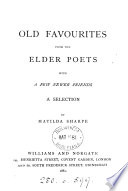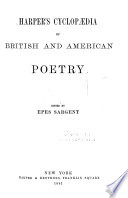 | Old favourites, Matilda Sharpe - 1881 - 438 pages
...Truth has such a face and such a mien, As to be loved needs only to be seen. AFTER HORACE. III. 29. Happy the man, and happy he alone, He who can call to-day his own ; He who, secure within, can say, To-morrow do thy worst, for I have lived to-day. From the EPISTLE TO SIR GODFREY... | |
 | 1881 - 300 pages
...half-a-crown in English money ; a French franc being equal to tenpence, nearly. IMPROVE THE PRESENT MOMENT. HAPPY the man, and happy he alone, He who can call to-day his own : He who, secure within, can say, TO-MORROW ! do thy worst, for I have lived TO-DAY ! Be fair or foul, or rain... | |
 | Epes Sargent - 1881 - 1000 pages
...are from their old foundations torn ; And woods, made thin with winds, their scattered honors mourn. oh my soul, devoutly thiuk, How, with affrighted ey secure within, can say, To-morrow, do thy worst, for I have lived to-day ! Be fair or foul, or rain... | |
 | Horace - 1881 - 420 pages
...genius of Dryden, and his peculiar mastery of the great rhythmical resources of our language : — ' " Happy the man, and happy he alone, He, who can call to-day his own ; He, who, secure within, can say, To-morrow do thy worst, for I have lived to-day. Be fair, or foul, or rain,... | |
 | George Saintsbury - 1881 - 216 pages
...than one of his characters. Indeed, the three last stanzas of this are well worth quotation, — THL Happy the man, and happy he alone, He, who can call to-day his own ; He who, secure within, can say, To-morrow do thy worst, for I have lived to-day ; Be fair, or foal, or rain,... | |
 | 1876 - 590 pages
...believer in the advice of his countryman, Dryden, concerning the " enjoyment of the present hour." "Happy the man, and happy he alone, He who can call to-day his own, He who, secure within, can say, To-morrow do thy worst, for I have lived to-day. Be fair, or foul, or rain... | |
 | David Armstrong - 1989 - 196 pages
...stream, Is sometimes high, and sometimes low, A quiet ebb, or a tempestuous flow, And always in extreme. Happy the man, and happy he alone, He, who can call today his own; He who, secure within, can say, "To-morrow do thy worst, for I have lived today; Be fair or foul, or rain,... | |
 | Robert Andrews - 1993 - 1214 pages
...CK CHESTERTON (1 874-1936), Brilish auihor. Л Miscellany of Men, "The Conlenied Man" 1 1 91 2]. 5 Happy the man, and happy he alone, He who can call today his own; He who, secure within, can say. Tomorrow, do thy worst, for I have lived today. JOHN DRYDEN (1631-1 700), English... | |
 | Donald A. Low - 1974 - 474 pages
...potctis sui Laetusque deget, cui licet in diem Dixisse vixi.1 Or, in the spirited version of Dryden, Happy the man, and happy he alone, He who can call to-day his own, He who, secure within, can say Tomorrow do thy worst, — for I have liv'd to-day. Sentiments akin to that... | |
 | Helen Bevington - 1996 - 238 pages
...laughter over tears, advocating "Short views, for God's sake, short views." Horace defined a happy man: Happy the man, and happy he alone, He, who can call today his own: He who, secure within, can say, Tomorrow do thy worst, for I have lived today. Be fair, or foul, or rain, or... | |
| |